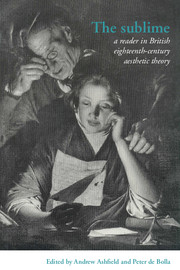Book contents
- Frontmatter
- Contents
- List of Abbreviations
- Introduction
- Part I The Longinian tradition
- Part II Rhapsody to rhetoric
- 11 The spectator, (1712-1714)
- 12 A discourse on ancient and modern learning (1734)
- 13 Characteristicks (1714)
- 14 The works (1724)
- 15 To David Fordyce, 18th June 1742
- 16 The pleasures of imagination (1744)
- 17 An essay on the sublime (1747)
- 18 Observations on man (1749)
- 19 Lectures on the sacred poetry of the Hebrews (1753/1787)
- 20 A dictionary of the English language (1755)
- 21 Conjectures on original composition (1759)
- 22 The art of speaking (1761)
- 23 A course of lectures on oratory and criticism (1777)
- 24 An enquiry concerning the principles of taste (1785)
- Part III Irish Perspectives
- Part IV The Aberdonian Enlightenment
- Part V Edinburgh and Glasgow
- Part VI From the Picturesque to the Political
- Sources and further reading
15 - To David Fordyce, 18th June 1742
Published online by Cambridge University Press: 05 June 2012
- Frontmatter
- Contents
- List of Abbreviations
- Introduction
- Part I The Longinian tradition
- Part II Rhapsody to rhetoric
- 11 The spectator, (1712-1714)
- 12 A discourse on ancient and modern learning (1734)
- 13 Characteristicks (1714)
- 14 The works (1724)
- 15 To David Fordyce, 18th June 1742
- 16 The pleasures of imagination (1744)
- 17 An essay on the sublime (1747)
- 18 Observations on man (1749)
- 19 Lectures on the sacred poetry of the Hebrews (1753/1787)
- 20 A dictionary of the English language (1755)
- 21 Conjectures on original composition (1759)
- 22 The art of speaking (1761)
- 23 A course of lectures on oratory and criticism (1777)
- 24 An enquiry concerning the principles of taste (1785)
- Part III Irish Perspectives
- Part IV The Aberdonian Enlightenment
- Part V Edinburgh and Glasgow
- Part VI From the Picturesque to the Political
- Sources and further reading
Summary
I should have answered your letter sooner, but that I was uncertain, till of late, whether to direct for you at Edinburgh or at Aberdeen. I durst not, however, reply in the language you wrote in; for though I could perhaps have filled two or three pages with Italian words ranged in grammatical order, yet, without assuming the natural air and spirit of the language, you would no more think I had wrote Italian than you would call that a musical composition which was only a number of concords put together without any regard to the rhythm or style of the whole. This reason was stronger in writing to you, who have attained so perfectly the wild elegance, the vagbezza, which the Italians are so fond of both in language and painting, and in which, I believe, they exceed all the moderns. What is good in the French authors is of a more sober, classical manner, and greater severity of design. The Spaniards, I imagine, approach much nearer to the Italian manners. Our English poetry has but little of it, and that chiefly among the older compositions of our countrymen – the juvenilia of Milton, and the fairy scenes of Spenser and Shakespeare. Our nervous and concise language does not willingly flow into this fanciful luxuriance; besides that the genius of our poetry delights in a vehemence of passion and philosophical sublimity of sentiments much above its reach. Since we parted, I have been chiefly employed in reading the Greek philosophers, especially the Stoics.
- Type
- Chapter
- Information
- The SublimeA Reader in British Eighteenth-Century Aesthetic Theory, pp. 84 - 85Publisher: Cambridge University PressPrint publication year: 1996



